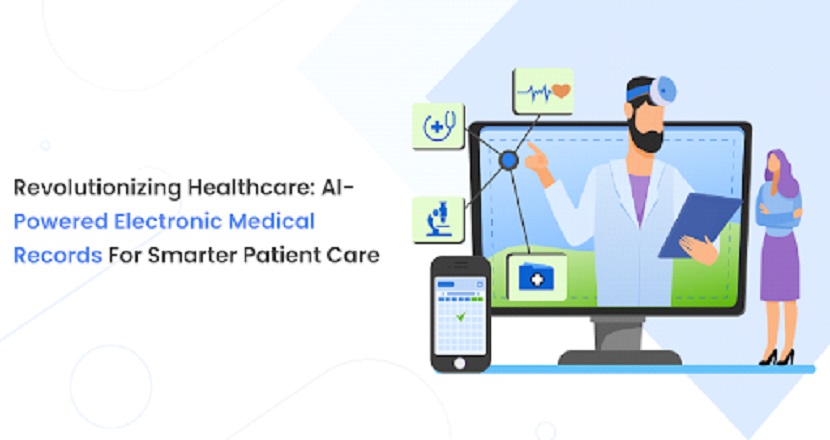Revolutionizing Healthcare: AI-Powered Electronic Medical Records for Smarter Patient Care
Empowering the healthcare industry on the go, an innovation in the intelligent AI-driven Electronic Medical Records (EMRs) changes patients’ experience with new intelligent interfaces. AI makes patient histories easier to understand, makes future health easier to predict, and provides a better way of working. The best EMR Software incorporates all these advancements enabling healthcare givers to provide precise individualized care while also handling paperwork. Find out about how intelligent healthcare will function with innovations in EMR systems of the future.
Understanding Electronic Medical Records (EMRs)
Electronic Medical Record (EMR) refers to computerized medical records developed to replace paper-chart records used by providers in delivering patient care. These records provide complete information on the patient history, dosimetry, diagnosis, prescriptions, treatment, immunization dates, and drug allergies along with test results. In contrast to paper-based medical records, EMRs are created to be efficient in terms of storage and use within the clinic or care facility and are meant to make clinical work more effective and, therefore, to improve the level of patient treatment.
So, what is EMR software? It concerns an electronic system through which the EMR is created and maintained as a secure and structured source of patient data. EMR software is beneficial in the practice as the provider can document and track patients’ records, enhance communication, and avoid penalties related to legal requirements. This also links up with other systems such as billing and scheduling systems to enhance the general organizational functionality.
Gone are the days when EMR software lacked features like artificial intelligence (AI), real-time analytics, and cloud access, several top-notch EMR software companies have transpired the healthcare industry significantly. They facilitate improved information decision-making, forecast, and individual patient management. Some of the leading players in this space include Epic Systems Company, Cerner Corporation, and Allscripts Health Systems Corporation which designs and implements efficient EMR systems. For anyone to comprehend EMRs and implement the right software, it becomes crucial for current and prospective healthcare providers interested in quality and efficient patient-centered care.
The Role of Artificial Intelligence in EMRs
AI is changing the way EMRs are utilized in healthcare delivery and Patient Management: The next level of precision has been established. Conventional models of EMRs are database systems for entering and storing patient information, while AI converts them into ongoing tools for data analysis and action. When applied to an EMR software solution AI becomes a major asset for healthcare providers.
AI in EMRs improves data analysis on the identification of trends and the likely consequences that have value for clinical decision-making. For example, it is possible to introduce algorithms that consider the patient’s history and estimate the risks more precisely and thus prevent complications. These capabilities enhance the process of diagnosis, strengthen treatment management and consequently improve patient benefits.
The application of AI in an EMR system hospital environment allows for streamlining of the processes of creating documentation and scheduling appointments in the hospital. This in turn helps in freeing more time for health care givers to attend to their clients rather than doing a lot of writing. In addition, the AI-embedded EMRs are compatible with IoT gadgets used in the provision of real-time health information.
In addition, integrated AI speeds up the interaction between different healthcare systems and provides stable data exchange. Through this integration, effective communication between different medical teams is enhanced as well as the workflow in the hospitals. As the AI technology advances it is expected that its function in the EMRs will become more significant, and influence the healthcare industry with better analytics.
Key Features of AI-Powered EMRs
Artificial intelligence is taking the healthcare industry by storm through the use of smart Electronic Medical Record Systems (EMR). These systems are not just EMR Software Solution that are merely storage tools but are equipped with most contemporary technologies to offer more than usual functions.
It could be noted that one of the major advantages of AI-based EMRs is the possibility of continuous and real-time analysis of the data. AI analyses vast amounts of patient data in a short time and presents insights that support healthcare decision-makers. For instance, the use of analytic models can anticipate patients’ probable health problems and recommend ways to avoid them enhancing patient health status.
Another important characteristic is clinical decision support systems (CDSS). These systems help in identifying diseases, suggesting treatment, and warning the providers of a mistake or of an interaction between drugs. This will take care to be safer and more personalized.
Moreover, AI-integrated EMRs have the feature of interoperability, which easily connects other healthcare IT systems and other devices. It also facilitates the communication of data between the various platforms enhancing the productivity of an organization.
Largely, the EMR software companies today realize the importance of NLP to reduce the complexity of documentation to a large extent. By using the NLP, a provider can speak the notes and what is said gets documented in an organized manner causing little or no disruption to administration.
Integrating all of these characteristics, AI-based EMR Software are defining a new paradigm of healthcare distribution, helping the providers to put their efforts into the patient and increasing general organizational effectiveness.
Benefits of AI-Powered EMRs
Using artificial intelligence the use of Electronic Medical Record (EMRs) is making a redefined shift in the health sector by providing several advantages that have positive impacts on patient care and organizational productivity. Here’s how these advanced systems are making an impact, particularly in an EMR system hospital setting:
-
Improved Patient Care
- Personalized Treatment Plans: Predicted treatment plan of the patient is best recommended by the AI whose objective is to provide the best results.
- Early Risk Detection: It is a form of assessment that alerts a patient of developing health complications which can then be addressed before they become complicated.
-
Enhanced Workflow Efficiency
- Automated Administrative Tasks: In documentation scheduling and billing, AI offers to take over these roles so that the healthcare staff does not have to be burdened with these tasks.
- Streamlined Communication: Data integration with other systems enables efficient data exchange leading to better teams’ cooperation.
- Increased Accuracy
- Error Reduction: AI eliminates the likelihood of human errors especially when entering a database for diagnosis and prescriptions.
- Real-Time Alerts: It also has alerts on drug interaction or treatment conflicts that make the patient safer.
- Cost Efficiency
- Resource Optimization: AI plays a role in resource management hence cutting down on costs of operations and minimizing wastage.
- Better Decision-Making: Informed decision-making increases the efficiency of the management of hospitals, as all decisions are based on relevant research.
Conclusion:
Advanced Electronic medical records & electronic health records systems are now delivering smarter, more efficient, and patient-centered care utilities enabled by AI solutions. These systems improve care through better analytical and organizational capabilities, as well as more provider support. Moving forward into the healthcare revolution and accepting the use of AI-based EMR Software is to reach the goal of the use of technology and kindness in the modern healthcare system.




